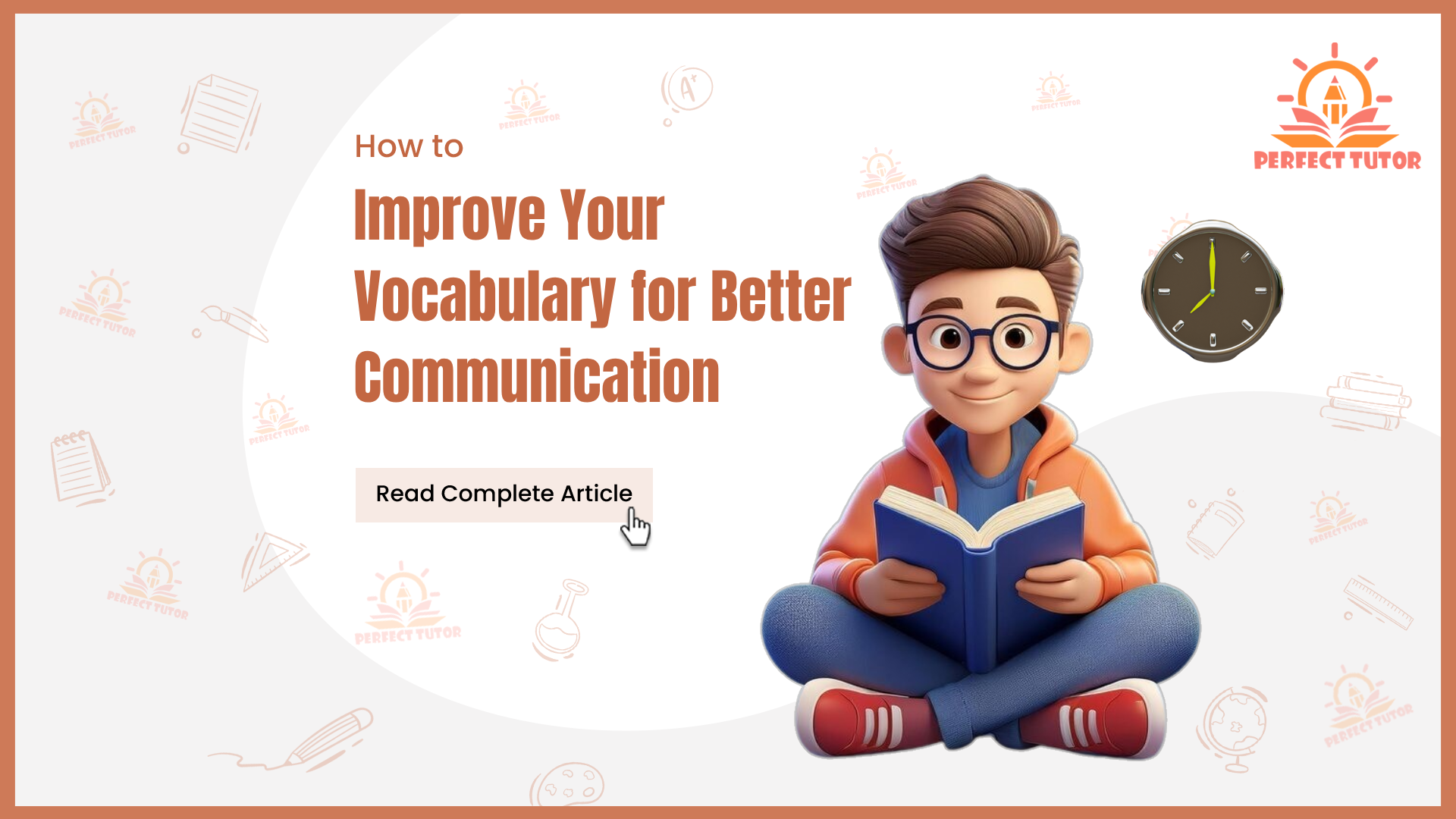How to Improve Your Vocabulary for Better Communication
Effective communication is an essential skill in today's world. Whether you're speaking in a meeting, writing an email, or having an informal conversation, your ability to express yourself clearly and confidently can make a huge difference. But what if you often find yourself struggling to find the right words or feel unsure about your vocabulary? This blog is here to help. If you have ever wondered, “How can I improve my English vocabulary and communication skills?” then you are in the right place.
In this blog, you'll learn simple, practical ways to increase your vocabulary and use it effectively in your daily life. We'll show you easy-to-follow strategies that fit into your busy routine, from reading and writing to using flashcards and engaging in conversations. Whether you're a student trying to ace an exam, a professional aiming to speak more confidently, or an individual looking to improve everyday conversation, these tips will guide you step-by-step.
By the end of this blog, you will not only have a richer vocabulary but also the skills to express yourself with more clarity and confidence. Get ready to unlock the power of words and transform the way you communicate!
Why is Vocabulary Important for Communication?
A rich vocabulary is the foundation of effective communication. It helps you express your thoughts clearly, build meaningful relationships, and leave a lasting impression. Whether you are giving a presentation, writing an email, or having an informal conversation, knowing the right words ensures that you can express your ideas with confidence and precision.
A strong vocabulary enhances your abilities to:
Express your thoughts clearly.
Understand others better.
Build confidence in conversations and presentations.
Create a positive impact in social and professional environments.
How Can I Improve My Vocabulary and Communication Skills?
Step 1. Read Regularly and Widely
Reading is one of the best ways to discover new words. Explore a variety of materials such as books, newspapers, blogs, and magazines. Start with topics you enjoy, and gradually expand to different genres.
Reading is one of the best ways to increase your vocabulary. Here's how to get started:
Read Books and Articles: Choose material that challenges you a little but not too much. Novels, newspapers, and blogs are great choices.
Highlight New Words: Use a highlighter or digital tool to mark unfamiliar words.
Look Up Definitions: Keep a dictionary with you or use an app like Merriam-Webster or Google Dictionary.
Step 2. Use a Dictionary or a Vocabulary App
A dictionary is your best friend when it comes to learning new words. Apps like Merriam-Webster, Word of the Day, or even dictionaries on smartphones can make learning fun and accessible.
Modern tools make vocabulary building easy:
Vocabulary Apps: Apps like Duolingo, Babbel, and Memrise offer structured learning.
Online Thesaurus: Explore synonyms and antonyms to deepen your understanding.
Word of the Day: Subscribe to services that deliver daily messages to your inbox.
Step 3. Practice Speaking and Writing
To improve your communication skills, it is important to use the words you learn. Practice speaking with friends, family or a language partner. Writing essays, journals or social media posts can also enhance your skills.
Practical application strengthens learning. Follow these tips:
Talk to Friends: Use your new words in everyday conversation.
Join Language Groups: Participate in English-speaking clubs or online forums.
Practice Alone: Talk to yourself or record your voice using the new vocabulary.
Step 4. Play Word Games and Puzzles
Participate in fun activities like Scrabble, crossword puzzles or word association games. These are great for increasing your vocabulary without making it feel like a chore.
Learning doesn't have to be boring. Get involved:
Crossword Puzzles
Scrabble or Boggle
Vocabulary Apps: Try games like Wordscapes or WordUp to make learning fun.
Step 5. Watch and Listen to English Content
Watching movies, listening to podcasts or watching English news channels introduces you to new words. This not only helps you learn vocabulary but also teaches correct pronunciation and usage.
Familiarize yourself with rich language material:
Podcasts: Choose educational or storytelling podcasts.
Movies and TV Shows: Watch English-language media with subtitles.
Speeches and TED Talks: Learn how experts use terminology effectively.
Take notes of interesting words and phrases and incorporate them into your speech.
Step 6. Use Flashcards
Flashcards are an effective tool for memorizing words. Write the word on one side and its meaning or usage on the other. Repeat them daily to consolidate your learning.
Flashcards are a proven way to memorize new words. Create a set of cards:
The word is on one side.
Its meaning, usage and example sentence on the other hand.
Review your cards daily. You can also use an app like Anki or Quizlet to make this process digital and portable.
Step 7. Learn Synonyms and Antonyms
Understanding synonyms and antonyms expands your vocabulary. For example, instead of saying "happy" over and over again, you can use "joyful", "satisfied" or "pleased".
Tip:
Make a list of common words used in everyday conversation and their alternatives.
Step 8. Practice Active Listening
Pay attention to how other people use words in conversations or presentations. Pay attention to their word choice, tone, and style of communication.
Step 9. Test Yourself Regularly
Take quizzes or online tests to evaluate your vocabulary progress. This helps identify areas of improvement and keeps you motivated.
Repetition is key to remembering vocabulary. Make time each week to review:
The words you've learned.
How to use them in sentences.
Common mistakes to avoid.
Benefits of a Strong Vocabulary
Improved Confidence: You will feel more confident while conversing.
Enhanced Professional Growth: Clear communication can open the doors to better career opportunities.
Stronger Relationships: Expressing your thoughts and feelings accurately leads to better understanding.
How Can Improved Vocabulary Help Communication Skills?
Better vocabulary enhances communication by enabling you to do the following:
Speak more precisely and confidently.
Write persuasive emails, essays, and messages.
Understand conversations and respond effectively.
Better communication strengthens relationships and opens doors to new opportunities.
FAQs
Q1. How can I improve my English vocabulary and communication skills?
You can improve by reading widely, practising speaking and writing, using apps, and participating in group discussions. It's important to be exposed to new words regularly.
Q2. Why is a strong vocabulary important for communication?
A strong vocabulary helps you express your thoughts clearly, understand others better, and leave a lasting impression in both personal and professional situations.
Q3. Are word games helpful for building vocabulary?
Yes, games like Scrabble and crossword puzzles make learning fun and help in memorizing new words in an enjoyable way.
Q4. What role does reading play in improving vocabulary?
Reading gives you the context of new words, helping you understand their meaning and use them effectively in communication.
Q5. How can Perfect Tutor help improve my communication skills?
Perfect Tutor provides personalized home tuition to enhance your vocabulary and communication skills in a structured, interactive way.
Q6: What are the best books to improve vocabulary?
Books such as 'Word Power Made Easy' by Norman Lewis and novels by authors such as Agatha Christie or George Orwell are excellent for learning vocabulary.
Q7: How do I use new vocabulary in communication?
Practice using new words in sentences, conversation, and writing. Join language groups to hone your skills.
Q8: Can watching movies improve vocabulary?
Yes, watching movies with subtitles helps you learn pronunciation, context and new words easily.
Q9: How often should I practice to see improvement?
Consistency is key. Spend at least 30 minutes a day reading, writing, and practising vocabulary.
Conclusion
Improving your vocabulary and communication skills isn't that difficult. By following the steps outlined in this blog - such as reading, using flashcards, engaging in conversations, and taking advantage of technology - you'll see improvements in the way you express yourself.
Get started today and watch your confidence grow as you communicate more effectively in both personal and professional situations.



 +91 8700847275
+91 8700847275
 +1 8009616567
+1 8009616567